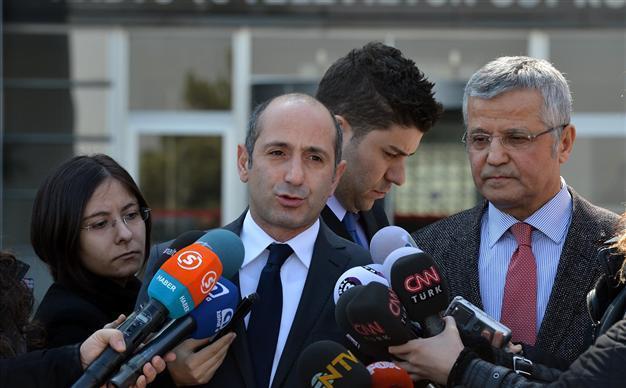Turkey’s TV watchdog sees heated wiretapping session
Meltem ÖZGENÇ ANKARA / Hürriyet

Ali Öztunç, who was selected to the RTÜK from the quota reserved for the CHP, speaks to press in front of Rtük building. AA Photo
A meeting at the Radio and Television Supreme Council’s (RTÜK) was marred by a heated debate between its members from the ruling Justice and Development Party (AKP) and the main opposition Republican People’s Party (CHP) on March 14.
The council had convened to decide whether private television CNNTürk should be fined over its broadcasting of CHP leader Kemal Kılıçdaroğlu’s party group speeches at Parliament last month, in which he read out wiretapped conversations related to the corruption investigations.
Ali Öztunç, who was selected to the RTÜK from the quota reserved for the CHP, protested the fact that several television stations had been fined on March 13. Öztunç stormed out of the meeting and spoke to reporters in front of the RTÜK building with Süleyman Demirkan, another council member.
“If you punish the TV channels that aired the party group speeches, then it will mean that you don’t guarantee freedom of speech. The next day, you may punish them for broadcasting the opposition’s election rallies,” Öztünç said.
The RTÜK had recently corresponded with its experts to prepare a report about the televisions that broadcasted Kılıçdaroğlu’s aforementioned speech. Labeling this decision a “fascistic practice,” Öztunç argued that reports had come to the council as “ordered” by government-appointed members.
“If you do it against Kılıçdaroğlu’s speech now, one day the same could be done when the Nationalist Movement Party [MHP] leader Mr. [Devlet] Bahçeli, the Peace and Democracy Party [BDP] co-chair Mr. [Selahattin] Demirtaş, or even Mr. Prime Minister Recep Tayyip Erdoğan speaks,” he said. Öztunç and Demirkan also took the opportunity to criticize the “one-sided editorial policy” of public broadcaster TRT.
The RTÜK released a written statement in response to these charges, arguing that the experts were not “ordered” to write a report. The “internal memo,” the RTÜK said, was only a request for an assessment and the experts are independent in their considerations.
The RTÜK is scheduled to convene again on March 19.
